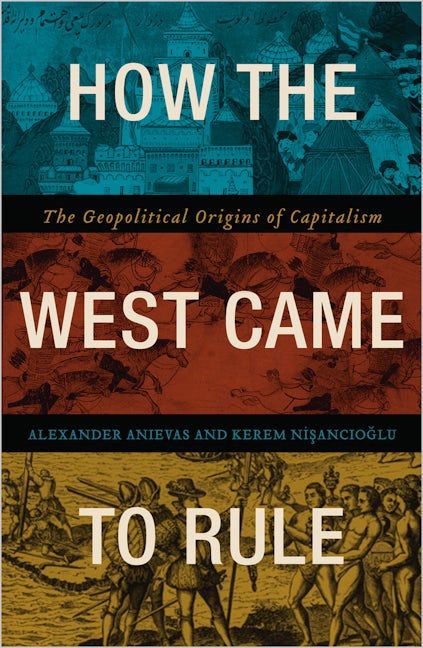
How the West Came to Rule
The Geopolitical Origins of Capitalism
A non-Eurocentric, sweeping look at the material conditions and events that created capitalism
*Winner of International Studies Association (ISA)'s International Political Sociology Best Book Prize for 2017*
*Winner of British International Studies Association (BISA)'s International Political Economy Working Group Book Prize of 2016*
*Shortlisted for the ISA Book Prize*
Mainstream historical accounts of the development of capitalism describe a process which is fundamentally European - a system that was born in the mills and factories of England or under the guillotines of the French Revolution. In this groundbreaking book, a very different story is told.
How the West Came to Rule offers a interdisciplinary and international historical account of the origins of capitalism. It argues that contrary to the dominant wisdom, capitalism's origins should not be understood as a development confined to the geographically and culturally sealed borders of Europe, but the outcome of a wider array of global processes in which non-European societies played a decisive role.
Through an outline of the uneven histories of Mongolian expansion, New World discoveries, Ottoman-Habsburg rivalry, the development of the Asian colonies and bourgeois revolutions, Alexander Anievas and Kerem Nisancioglu provide an account of how these diverse events and processes came together to produce capitalism.
This book is available to download through the Open Access programme.
Alexander Anievas is Assistant Professor of Political Science in the Department of Political Science at the University of Connecticut. He is the author of Capital, the State, and War 1914-1945 (University of Michigan Press, 2014), How the West Came to Rule (Pluto, 2015) and editor of Marxism and World Politics: Contesting Global Capitalism (Routledge, 2010).
Kerem Nişancıoğlu is a Lecturer in International Relations at SOAS, University of London. He is the co-author of How the West Came to Rule (Pluto, 2015), and co-editor of Decolonising the University (Pluto, 2018). He also blogs at The Disorder of Things.
'A fundamental rethinking of the origins of capitalism and the emergence of Western domination by the interactive relations with the non-European world. Highly Recommended.'
- CHOICE'A fascinating tour de force that will surely be debated in the fields of history, sociology, Marxism and International Relations for years to come'
- Justin Rosenberg, Professor in International Relations at the University of Sussex'An excellent book'
- Professor John M. Hobson, University of Sheffield'This rigorously argued book presents a compelling challenge to standard narratives of capitalist modernity. The authors combine theoretical sophistication and a wide-ranging account of extra-European histories to provide a superb - and provocative - alternative'
- Gurminder K Bhambra, author of Connected Sociologies'A superb account which successfully transcends a false dichotomy. Drawing on the best aspects of Historical Sociology and International Relations, and within a rigorous Marxist framework, the authors offer a challenge to all existing explanations of the rise of the West to world dominance'
- Neil Davidson, author of How Revolutionary Were the Bourgeois Revolutions?'There is much talk these days of Big History, yet the advocates invariably stop short of talking about capitalism. With their bold and wide-ranging treatment, Anievas and Nişancıoğlu now place the origins of capitalism at the very centre of the agenda'
- Geoff Eley, Karl Pohrt Distinguished University Professor of Contemporary History at the University of Michigan'An excellent, inventive and fascinating piece of scholarship'
- Tony Mckenna, Marx & Philosophy Review of Books'A work of towering scholarly erudition combined with deep political insights that must be reckoned with'
- Louis Proyect'Provocative and brilliant ... An enormous contribution to redressing the one-sided debates about the origins of capitalism and the West's conquest of the planet ... Their book should be read by anyone hoping to understand as well as challenge Eurocentrism, imperialism, and the capitalist system as a whole'
- International Socialist Review'Provides an important introduction to a truly global history of the origins of capitalism which recognises the vital inputs and roles of a range of non-European societies'
- Review of African Political EconomyList of Figures
Acknowledgements
Introduction
1. The Transition Debate: Theories and Critique
2. Rethinking the Origins of Capitalism: The Theory of Uneven and Combined Development
3. The Long Thirteenth Century: Structural Crisis, Conjunctural Catastrophe
4. The Ottoman-Habsburg Rivalry over the Long Sixteenth Century
5. The Atlantic Sources of European Capitalism, Territorial Sovereignty and the Modern Self
6. The ‘Classical’ Bourgeois Revolutions in the History of Uneven and Combined Development
7. Combined Encounters: Dutch Colonisation in South-East Asia and the Contradictions of ‘Free Labour’
8. Origins of the Great Divergence over the Longue Durée: Rethinking the ‘Rise of the West’
Conclusion
Notes
Index
150mm x 230mm

